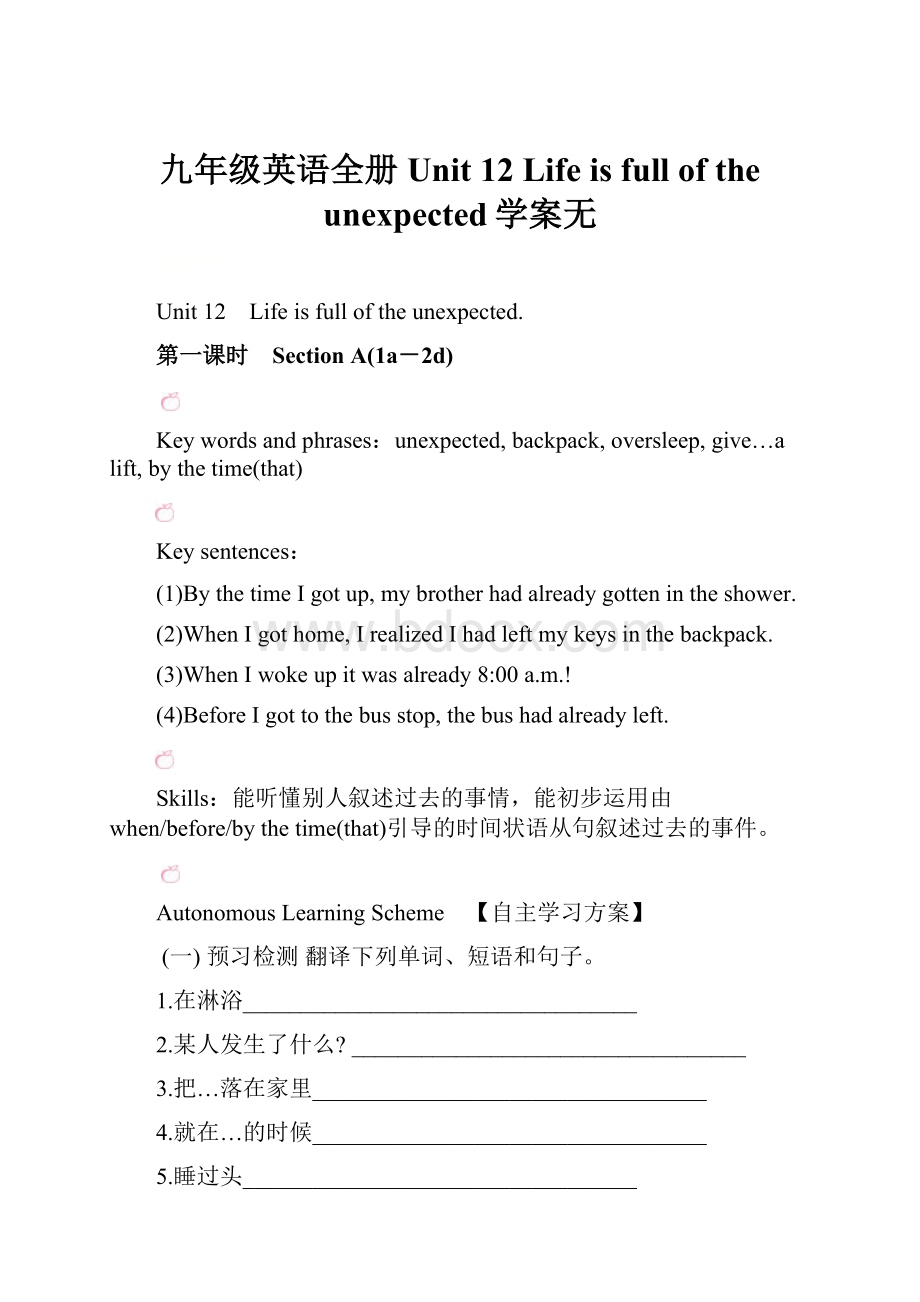九年级英语全册 Unit 12 Life is full of the unexpected学案无.docx
《九年级英语全册 Unit 12 Life is full of the unexpected学案无.docx》由会员分享,可在线阅读,更多相关《九年级英语全册 Unit 12 Life is full of the unexpected学案无.docx(11页珍藏版)》请在冰豆网上搜索。

九年级英语全册Unit12Lifeisfulloftheunexpected学案无
Unit12 Lifeisfulloftheunexpected.
第一课时 SectionA(1a-2d)
Keywordsandphrases:
unexpected,backpack,oversleep,give…alift,bythetime(that)
Keysentences:
(1)BythetimeIgotup,mybrotherhadalreadygottenintheshower.
(2)WhenIgothome,IrealizedIhadleftmykeysinthebackpack.
(3)WhenIwokeupitwasalready8:
00a.m.!
(4)BeforeIgottothebusstop,thebushadalreadyleft.
Skills:
能听懂别人叙述过去的事情,能初步运用由when/before/bythetime(that)引导的时间状语从句叙述过去的事件。
AutonomousLearningScheme 【自主学习方案】
(一)预习检测翻译下列单词、短语和句子。
1.在淋浴__________________________________
2.某人发生了什么?
__________________________________
3.把…落在家里__________________________________
4.就在…的时候__________________________________
5.睡过头__________________________________
6.上课迟到________________________________________
7.停止运转,不工作了_________________________________
8.捎(某人)一程__________________________________
ClassroomLearningGuidanceScheme 【课堂导学案】
【知识点拨】
1.BythetimeIgotoutside,thebushadalreadyleft.当我出来时,公共汽车已经离开了。
“bythetime”表示“当/到……时”,引导时间状语从句。
如果从句中用了一般过去时,主句中常用过去完成时;如果主句中用了将来时,从句中常用一般现在时表将来。
如:
BythetimeIgotup,hehadalreadyleft.当我起床时,他已经离开了。
Hewillbeateacherbythetimeheistwenty.到他二十岁时,他会成为一名教师。
【拓展】bynow表示“到现在为止”,通常与现在完成时连用。
如:
BynowIhavecollected200dolls.到现在为止,我已收集了二百个布娃娃。
【小试牛刀】根据汉语提示完成下面的句子,每空一词。
(1)当我到车站时,火车已经开走了。
______________________Igottothestation,thetrain______________________left.
(2)长大后,他会离开这儿。
He______________________herebythetimehe___________up.
2.Myalarmclockdidn'tgooff!
我的闹钟没响。
gooff意为“发出响声”。
如:
Somethingwaswrongwithmyalarmclockanditdidn'tgooff.我的闹钟出毛病了,它没有响!
【拓展】
(1)goby意为“(时间)过去;消逝”。
如:
Timegoesbysecondbysecond.时间一秒秒地消逝。
(2)goon继续。
如:
Pleasegoonworking.请继续工作。
【小试牛刀】单项选择。
—Whywereyoulatethismorning?
—Myalarmclockdidn't______,soIoverslept.
A.gobyB.goonC.gooffD.godown
3.Carl'sdadsawmeonthestreetandgavemealiftinhiscar.卡尔的爸爸在街上看到我,捎了我一程。
givesb.alift是动词短语,意为“捎某人一程”,相当于givesb.aride/givearidetosb.。
如:
I’malittlelate,canyougivemealift,dad?
我要迟到了,你能捎我一程吗,爸爸?
【小试牛刀】他让我搭便车去车站。
He__________________________________________tothestation.
【达标训练】单项选择。
()1.Tomdrovebyandgavemea_________onthewayhome.
A.flightB.runC.walkD.lift
()2.WhenIgottothecinema,themovie_________forfiveminutes.
A.beganB.hadbegunC.hadbeenonD.hasbeenon
()3.Shewillbeanurse_________shegraduatesfromtheschool.
A.bythetimeB.atthistimeC.atthattimeD.atatime
()4.Thealarmis_________.Theremustbesomethingwrongwiththecar.
A.goingonB.goingbyC.goingoffD.goingdown
()5.I_________thismorningandmissedtheearlybus.
A.oversleptB.sleptC.heldD.caught
Ⅱ.根据汉语提示完成下面的句子,每空一词。
1.他醒来发觉自己在医院里。
He________________________andfoundhimselfinhospital.
2.看!
那些孩子正向学校飞奔。
Look!
Thechildrenare________________________toschool.
3.他穿上大衣走了出去。
He________________________hiscoatandwentout.
4.你每天应该至少刷两次牙。
Youshouldbrushteeth________________________twiceaday.
5.他踩了我的脚,甚至连一声“对不起”都没有说。
He____________________________________“sorry”whenhesteppedonmytoes.
归纳总结:
“unexpected,backpack,oversleep,give…alift,bythetime(that)”和重点句型
1.BythetimeIgotup,mybrotherhadalreadygottenintheshower.
2.WhenIgothome,IrealizedIhadleftmykeysinthebackpack.
3.WhenIwokeupitwasalready8:
00a.m.!
4.BeforeIgottothebusstop,thebushadalreadyleft.”
第二课时 SectionA(3a-4c)
Keywordsandphrases:
block,worker,above,burn,alive,airport,till,west,cream,workday,pie,showup,bean,market,bytheendof
Keysentences:
(1)WhenIgottoschool,IrealizedthatIhadleftmybackpackathome.
(2)BythetimeIgotbacktoschool,thebellhadrung.
(3)BeforeIgottothebusstop,thebushadalreadyleft.
(4)IwasabouttogouptomyofficewhenIdecidedtogetacoffeefirst.
(5)AsIwaswaitinginlinewiththeotherofficeworkers,Iheardaloudsound.
Skills:
运用由when/before/bythetime引导的时间状语从句叙述过去的事件。
AutonomousLearningScheme 【自主学习方案】
(一)预习检测翻译。
1.世贸中心___________________2.beaboutto_______________________
3.goup_______________________4.myfavoritecoffeeplace____________________
5.排队等候________________________6.怀疑地凝视着_______________________
7.thinktooneself______________________8.hearabout______________________
9.thedaybefore______________________10.endupdoingsth.______________________
11.showup_______________________12.Lifeisfulloftheunexpected.______________________
13.Mybadluckhadunexpectedlyturnedintoagoodthing.________________________________
【知识点拨】
1.Westaredindisbeliefattheblacksmokerisingabovetheburningbuilding.
我们难以置信地看着燃烧的建筑物升起的黑烟。
burn动词,有两个基本意思:
(1)燃烧,点燃,发光
如:
Sheburntacandle.她点燃了一根蜡烛。
Weburncoaltokeepwarm.我们烧煤取暖。
(2)烧伤,烧焦,烫伤,晒黑
如:
Thechildgotburntwhileplayingwithfire.那小孩玩火时,把自己烧伤了。
【拓展】
(1)burnaway烧掉
如:
Halfofthecandlehadburntaway.蜡烛已烧掉一半了。
(2)burndown渐渐烧完
如:
Theroomgrewcolderasthefireburntdown.随着炉火逐渐减弱,屋里越来越冷。
【小试牛刀】根据汉语提示完成下面的句子,每空一词。
(1)她的信已经烧了。
Herlettershave________________________________.
(2)他的手在炉子上烫伤了。
He________________________________________onahotstove.
2.Ifeltluckytobealive.我感到很幸运能活下来。
辨析:
alive,living,live与lively
alive“活着,活的,有生命的,还出气的”,可指人也可指物,可作表语、后置定语、宾补。
living“活着,尚在人间,健在的”,指人或物,作定语或表语。
live“活着的,活生生的”,指物,不指人,作定语。
lively“活泼的,活跃的,充满生气的”,可指人,也可指物,作定语、表语或宾补。
【小试牛刀】单项选择。
(1)JinYongisoneofthegreatestandoldest______writers.Heisstill______.
A.living;aliveB.living;liveC.alive;livingD.alive;lively
(2)—Ishisgrandmotherstill______?
—Yes,sheis102yearsold!
A.liveB.livingC.aliveD.lively
3.TheotherplaneswerefullsoIhadtowaittillthenextday.别的飞机也满员了,因此我不得不等到第二天。
till意为“到,直到”,相当于until
(1)用于肯定句时,主句的动词只用延续性的,它所表示的动作一直延续到till或until表示的时间为止,意为“直到…为止”。
如:
ShewatchedTVtillhermothercameback.她看电视直到她母亲回来。
(2)用于否定句时,主句的动词一般是非延续性的,也可以是延续性的,它所表示的动作直到till或until所表示的时间才发生,意为“直到…(才)”。
如:
Shedidn'twatchTVtillhermothercameback.直到她母亲回来她才(开始)看电视。
【小试牛刀】单项选择。
(1)Ididn'tbelievehecoulddrive______hetoldme.
A.onceB.whileC.sinceD.till
(2)—Mark,youlooksotired.—Oh,Iworked______itwas12o’clocklastnight.
A.unlessB.afterC.tillD.as
第三课时 SectionB(1a-1e)
Keywordsandphrases:
fool,costume,embarrassed,costumeparty
Keysentences:
(1)WhathappenedtoDaveonAprilFool'sDay?
(2)Afriendinvitedhimtoacostumeparty.
AutonomousLearningScheme 【自主学习方案】
(一)预习检测完成下列短语。
1.愚人节________________________________________
2.化装舞会________________________________________
3.赶到,露面________________________________________
4.邀请某人做某事________________________________________
5.getdressed________________________________________
6.不睡觉,熬夜________________________________________
【知识点拨】happen的“三种用法”与“三点注意”:
1.happen是不及物动词。
happen在初中英语教材中的用法主要有以下三种:
(1)“sth.+happen+地点/时间”,意为“某地/某时发生了某事”。
如:
Anaccidenthappenedinthatstreet.那条街发生了一起事故。
What'shappeningoutside?
外面发生什么事了?
(2)“sth.+happento+sb.”意为“某人出了某事(常指不好的事发生在某人身上)”。
如:
Acaraccidenthappenedtohimyesterday.昨天他发生了交通事故。
Whathappenedtoyou?
(=Whatwaswrong/thematterwithyou?
)你怎么啦?
(3)“sb.+happen+todosth.”意为“某人碰巧做某事”。
如:
Ihappenedtomeetherinthestreet.我碰巧在街上遇见她了。
IthappenedthatIwasoutwhenhecalled.他来访时我碰巧不在。
2.同学们在使用happen时,以下三点情况值得注意:
(1)happen为不及物动词,不能用于被动语态。
例如,要表示“这个故事发生在去年。
”不能说:
Thestorywashappenedlastyear.但可以说:
Thestoryhappenedlastyear.
(2)happen为短暂性动词,不能与表示一段时间的状语连用。
例如,要表示“这事发生一年了。
”不能说:
Thishappenedforoneyear.但可以说:
Thishappenedoneyearago.
(3)happen一般用来强调某事发生的偶然性。
如要表示事先安排或有准备的事情或活动,则不能用happen,而要用takeplace。
如:
Asportsmeetingtookplace(=washeld)inourschoollastweek.上周我校举行了运动会。
(不能说:
Asportsmeetinghappenedinourschoollastweek.)
TeachingReflection 【教学反思】
本节课主要让学生通过听说活动了解Nick/Dave/Joe所谈论的愚人节的事情,并能相互叙述愚人节的故事,培养学生和别人一起分享过去的事情的能力,要求学生掌握的单词、短语有fool,costume,embarrassed,costumeparty和重要句型:
WhathappenedtoDaveonAprilFool'sDay?
Afriendinvitedhimtoacostumeparty.
第四课时 SectionB(2a-2e)
Keywordsandphrases:
sellout,discovery,lady,cancel,officer,believable,disappear,embarrassing
Keysentences:
(1)AprilFool’sDayisacelebrationthattakesplaceindifferentcountriesaroundtheworld.
(2)Manypeoplerantotheirlocalsupermarketstobuyasmuchspaghettiastheycould.
(二)预习检测完成下列短语。
1.相互开各种各样的玩笑,玩恶作剧__________________________________________
2.售完,卖完________________________________________________
3.减肥________________________________________________
4.spreadacross________________________________________________
5.endupdoingsth.________________________________________________
6.moveacross________________________________________________
7.一个骗局________________________________________________
【知识点拨】
1.AprilFool'sDayisacelebrationthattakesplaceindifferentcountriesaroundtheworld.
愚人节是一种发生在世界上不同国家的庆祝活动。
辨析:
happen与takeplace
happen常指具体的事情的发生,特别指那些偶然的“发生”。
后接不定式时,表示“碰巧,恰好”之意。
如:
Newthingsarehappeningallaroundus.新事在我们周围不断发生。
Ihappenedtobeinthelabthatday.那天我碰巧在实验室。
takeplace通常指事先计划或预料到的“发生”。
还可表示“举行”的意思。
如:
GreatchangeshavetakenplaceinChinasince1980.自1980年以来,中国发生了巨大的变化。
Thesportsmeetingwilltakeplaceinourschool.运动会将在我校举行。
【小试牛刀】用happen和takeplace填空。
(1)WhenwillthebasketballmatchbetweenClass3andClass4___________________?
(2)I________________tohavereadthearticlewhenheaskedmeaboutit.
(3)Whenwilltheceremony____________________?
(4)Thataccident________________atthecorner.
2.Manypeoplerantotheirlocalsupermarketstobuyasmuchspaghettiastheycould.
很多人跑到当地的超市抢购尽可能多的意大利面条。
as+形容词/副词的原级+assb.can/could意为“尽可能地…”,在句中作状语。
as+形容词/副词的原级+assb.can/could=as+形容词/副词原级+as